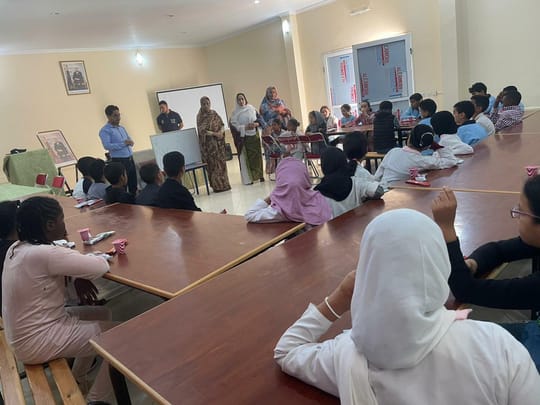Breaking with Tradition: Including Young Voices in Decision Making in Bir Gandus

In a rural community in the Dakhla Oued Ed Dahab region, the High Atlas Foundation (HAF), with the support of the Middle East Partnership Initiative (MEPI), successfully included the voice of children in a community participatory process that was launched to design solutions for local education. In March 2024, HAF hosted a forum for local community members to discuss priorities and challenges in the arid rural municipality of Bir Gandus, which is located over three hours outside of Dakhla, and is largely ignored by development agencies.
This community of around 5,000 people faces numerous challenges including a lack of access to government services, the ongoing impact of climate change with the longstanding drought and soaring temperatures, stagnating youth and women social indicators, threats to the traditional nomadic herding livelihood, and periodic tension from the nearby border with Mauritania.
HAF facilitators accompanied the community members through the participatory experience of identifying a problem, mapping out local resources and goals, and developing a solution based on local conditions and needs. Community members reached consensus that educational regression, especially in primary schools, was an urgent priority that needed immediate attention.
Students are not meeting critical developmental milestones such as arithmetic standards and many are dropping out at a young age. Community members selected a local educational association called Qodwa to be the lead implementer in developing a program to make local education more attractive and interesting as a way to keep students engaged and achieving beyond the traditional educational approach of memorization. Traditionally, in this region children are not considered capable decision makers and are not consulted regarding issues that impact their lives, however the community understood the value of breaking with tradition to include young voices in the participatory process.
From January to June 2024, HAF and Qodwa kept the voices of the students and the local community members as the drivers of the participatory process by facilitating four sessions (each for three days) of civic awareness and participatory planning, and two community forums, with 73 students (38 girls, 35 boys). These local forums drew lots of attention and even included participation from local government officials, including the El Caid of Bir Gandus, and local teachers who will be the lead implementers of the new educational approach.
Community members, many of whom are also parents, encouraged their children to share their opinions directly, and the program also hosted school events. Additionally Qodwa hosted a visit to a local utility company as a “career day” event to help the students envision where education can take them.
“I was very happy when I was part of a group of 16 students who met with local decision makers, and I think I will be a young engineer in Bir Gandus in the field of drinking water, because I liked the way the officials explained their work with passion. I would like to be part of the team that helps provide drinking water to Bir Gandus in a safe way one day,” said Mohammed Salem, a student at Bir Gandus primary school.
During the participatory approach, students expressed a desire for a new educational approach that fosters their creativity and innovative intelligence and keeps learning interesting. Students expressed awareness of modern and international techniques in education that included “makerspaces” and hands-on approaches to developing skills and hobbies that can help students set career goals or hobbies including computer programming, foreign language, and art. The students of Bir Gandus have dreams and want their local educational system to help them on their journey.
The outputs from the HAF facilitated process were outlined into a community advocacy letter sent from the local parent association to the provincial director of education of the Aousserd Province defining the community’s needs, the plan to improve education, and requesting resources to help make the student's dreams a reality. The community action has continued with teachers, schools, parents, government authorities and students remaining in frequent contact.
New formal advocacy initiatives are being formed including the Citizenship Tent for Capacity Building which was selected for funding as part of the MEPI program. The Citizenship Tent serves as a community liaison between local schools and the government, introducing instructors to new participatory pedagogical methods and training students to proactively advocate for their needs.
Next month, all stakeholders, including officials, students, parents, and teachers will gather for another forum. They will evaluate the achievements of the education initiative and build greater public awareness about the Citizenship Tent initiative and the other four community projects launched by the MEPI-HAF program. The new participatory network in Bir Gandus made and composed by members of communities, civil associations, and local government agencies, continues participatory planning, design, evaluation and advocacy in envisioning its future, and most importantly, now it includes youth as valuable decision makers.